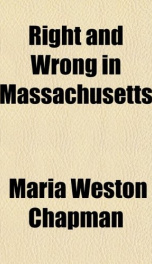right and wrong in massachusetts

Purchase of this book includes free trial access to www.million-books.com where you can read more than a million books for free. This is an OCR edition with typos. Excerpt from book: CHAPTER II. THE CLERICAL APPEAL. Christian. Did you know, about ten yearfago, one TempoRary, who dwelt next door to one Turnback 1 Since we are talking about him, let us a little inquire into the reason of the Budden backsliding of him and such others. Hopeful. It may be profitable. Bus Van. The re-action of the church, in consequence of such an effort as the one made by this Convention, was greater than some who had fancied themselves abolitionists were able to bear. Compelled to choose between their pro-slavery brethren of the church and ministry and their brethren of the abolition cause, they shrunk from the latter. Their efforts to justify themselves in cramping the cause, that they might avoid its reproach, constitute an era in its progress, known as the " Boston Controversy." The plan originated with five clergymen of Boston and vicinity, the Rev.Messrs.Charles Fitch, Joseph H. Towne, Jonas Perkins, David Sandford, and William Cornell. When the ecclesiastical tumult swelled high, their hearts were stirred up with it, as the water of inland wells is said to rise and fall with the ebb and flow of the bitter ocean tide without. Their appeal commenced with an acknowledgment of the sins of their brethren, in the use of harsh language, and an accusation of the most prominent abolitionists, of an unkind, improper and unchristian course, as such, assuming as one of the principles of action in the cause, that it must not be presented in a " brother's pulpit," when by so doing a brother might be aggrieved. This last assumption was in direct contradiction to the motto of every pulpit, as well as in defiance of the professed principles of every Christian minister to "cry aloud and spare not " in the promulgation of truth, and "to show the people their transgressions," "...
Info about the book
Author:
Series:
Unknown
ISBN:
1177546639
Rating:
4/5 (2)Your rating:
0/5
Languge:
English
Users who have this book
Users who want this book
What readers are saying
What do you think? Write your own comment on this book!
write a commentif you like right and wrong in massachusetts try:
Other books by this author
Do you want to exchange books? It’s EASY!
Get registered and find other users who want to give their favourite books to good hands!


